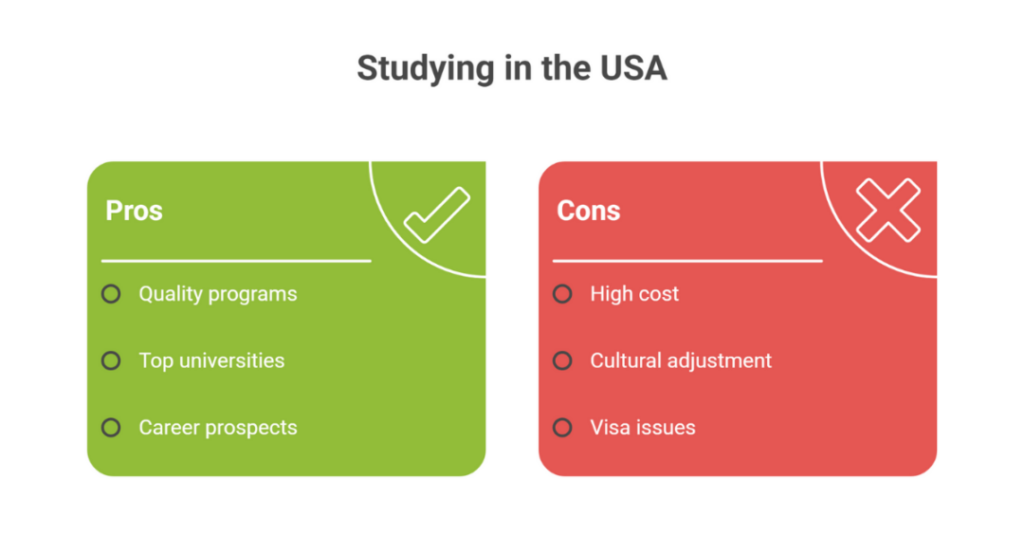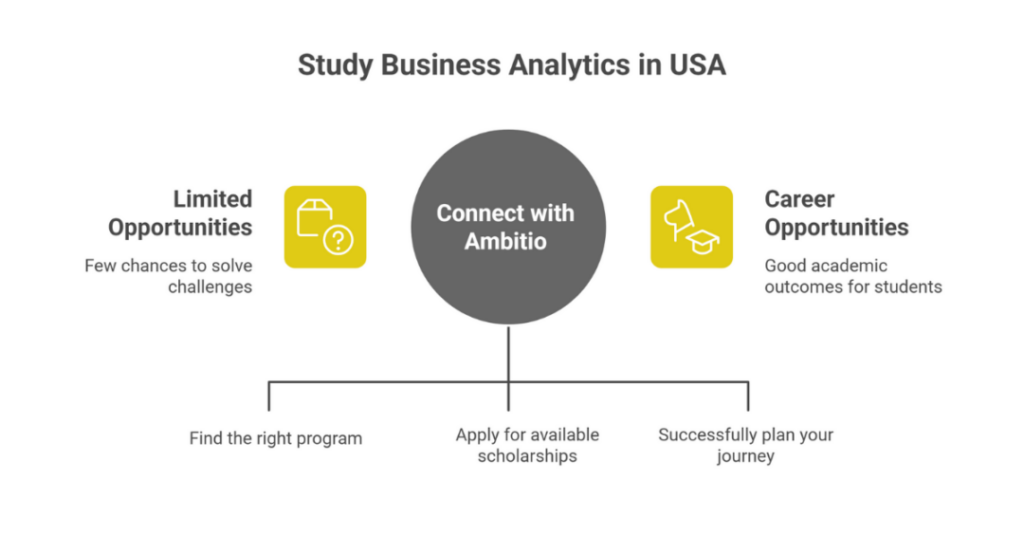26 August 2025
6 minutes read
Affordable MS in Business Analytics in USA for Indian Students: Top Universities for MBA and MSBA Program, Scholarship and More

Key Takeaways
- Affordable MS in Business Analytics in USA helps Indian students access STEM-designated programs with hands-on experience.
- Affordable MS in Business Analytics in USA offers scholarships and assistantships at top ranked universities.
- Affordable MS in Business Analytics in USA leads to high-paying roles in data analytics and business intelligence.
Study in USA continues to be a dream for a lot of Indian students, particularly those who want an affordable way to get a masters in business analytics.
With quality academic programs, top-ranked universities, and great career prospects, the USA for international students is home to many advanced analytics and business intelligence programs that prepare graduates for real business scenarios.
Is Graduate and Masters in Business Analytics in USA Worth it?
An interesting fact is that over 70% of Fortune 500 companies actively hire business analytics graduates in the USA. Such statistics are the reason why a master of science in business or a master of business analytics and business analytics degree could be life changing.

Pursuing a science in business analytics or a masters in business-analytics in the USA exposes students to solid business skills and hands-on experiences. Here is a summary of why its worth it:
- Occupational opportunities with top employers, and top companies in various industries such as consulting, finance, and technology.
- STEM-designated MS in Business Analytics programs that offer extended Optional Practical Training (OPT) for domestic and international students alike.
- The decision-making power which comes from mastering business intelligence, data analytics, and advanced analytics tools.
Table: Advantages of getting MS in Business Analytics in the USA
| Advantage | Description |
|---|---|
| Solid academic foundation | Courses focus on solving business problems |
| Real-world experience | Work on business projects with real-world implications and internships |
| Career Services | Support provided for business analytics graduates |
Affordable MS in Business Analytics in USA for Indian Students
Surprise, surprise! Some of the best colleges in the USA provide cheap master’s-degrees in business analytics, without sacrificing quality. Accessibility can change the narrative for some Indian students looking for a business master’s-degree.
To obtain a degree in business analytics, students are taking hands-on classes, solving complex business scenarios, and saving money. Below are some affordable options.
- Public universities often offer lower tuition than private business master’s-degree schools.
- Scholarships reduce costs for both domestic and international students.
- Assistantships provide hands-on work experience while offering a financial subsidy for working adults and non-working adults.
Table: Affordable MSBA Choices in the USA
| University | Approx. Tuition (per year) | Scholarship Availability |
| University of Texas | $18,000 – $25,000 | Yes |
| Oklahoma State University | $20,000 | Yes |
| University of South Florida | $17,500 | Yes |
MSBA vs MBA in Business Analytics: Which One is More Data-Driven?
Fun fact: The first MBA program was established in 1908, but the master’s in business analytics is much newer and, more importantly, highly data-driven. Choosing between an MBA and MSBA depends on what each student hopes to accomplish.
An M.B.A in Business Analytics typically focuses on a larger business operations and business skills focus, while MSBA programs focus on analytic skills and applied problem solving. One develops leaders for business operations, and one develops data-analysts and decision-makers.

Table: M.S.B.A vs M.B.A comparison
| Feature | M.S.B.A | M.B.A (with Business Analytics) |
| Focus | Data analytics and advanced analytics | Broader business management |
| Hands on Coursework | Strong emphasis | Moderate emphasis |
| Target Audience | STEM-focused students and working professionals | Business leaders with work-experience |
| Career Path | Data-analyst, business analyst | Business masters roles, consulting |
Top Universities for MS in Business Analytics Program and MBA for International Students
Did you know that there are over 100 universities in the USA offering analytics programs for solving business-problems? With so many options to choose from, it can be a daunting task for international students to narrow down the top programs from the overall list.
The table below shows the top ranked programs offered from the best universities including, MIT, Harvard, and many others.
This tailored list of the top 15 programs will assist an Indian student with his/her application by providing standard information to include in their transcripts, GPA, letter of recommendation, personal statement, statement of purpose, resume, and test scores for ACT, IELTS, TOEFL, GRE, SAT, and GMAT.
Table: Top 15 Programs in Business Analytics in the USA
| Sl. No | University / College of Business | Program (MSBA/MBA) | Documents Required | Exams |
| 1 | MIT Sloan School of Management | MS in Business Analytics | Transcripts, SOP, Resume | GRE/GMAT |
| 2 | University of Texas, Austin | M.S.B.A | GPA, SOP, LORs | GRE/GMAT |
| 3 | Carnegie Mellon University | MS in Business Analytics | Transcripts, Resume | GRE/GMAT |
| 4 | University of Southern California | M.S.B.A | SOP, Resume, LORs | GRE/GMAT |
| 5 | Northwestern University | M.S.B.A | SOP, Resume, GPA | GRE/GMAT |
| 6 | University of South Florida | MS in Business Analytics | SOP, LORs | GRE |
| 7 | Columbia University | M.B.A with Business Analytics | SOP, LORs | GMAT |
| 8 | New York University (Stern) | M.S.B.A | Resume, SOP, GPA | GRE/GMAT |
| 9 | University of Michigan | M.S.B.A | SOP, Resume, GPA | GRE/GMAT |
| 10 | Oklahoma State University | M.S.B.A | Transcripts, SOP | GRE |
| 11 | Harvard Business School | M.B.A with Analytics | SOP, LORs, Resume | GMAT |
| 12 | Duke University (Fuqua) | M.S.B.A | SOP, Resume, LORs | GRE/GMAT |
| 13 | Purdue University | MS in Business Analytics | SOP, Resume | GRE/GMAT |
| 14 | University of California, Los Angeles | M.S.B.A | SOP, Resume, LORs | GRE/GMAT |
| 15 | University of Illinois Urbana-Champaign | M.S.B.A | SOP, GPA, Resume | GRE/GMAT |
Admission Requirements, Eligibility Requirements, Tuition Fees and Scholarship Options for Business Analytics Degree
A little fun fact: Some universities will offer students waivers for their GRE/GMAT for prospective students with strong academic records and work experience! This allows more access to admissions for international students.
Table: Admission and Fees Details
| Requirement | Details |
| GPA | Minimum 3.0 preferred |
| Transcripts | From all previous institutions |
| Standardized Tests | GRE, GMAT, ACT, SAT (some waivers available) |
| English Proficiency | IELTS/TOEFL required |
| Tuition Fees | $18,000 – $60,000 annually depending on college of business |
| Scholarships | Merit-based, need-based, and assistantships |
Other Important Entry Requirements for MS in Business Administration and Analytics
Did you know that universities also want personal statements and resumes just as much, if not more than scores? These documents are how a student is going to showcase their potential for developing solutions to business issues, and their track record related to solving business issues.
Table: Other Requirements
| Requirement | Details |
| Statement of Purpose | Must include reasons for goals in career and decision making |
| Letter of Recommendation | Generally need 2-3 years worth |
| Resume | Outlining work experiences and projects |
| Personal Statement | Strong interest in business analytics master’s programs at top universities like Harvard |
Are Data Science, Large Data Visualization and Machine Learning Required to Be a Business Analyst?
A little fun fact: Data analysts spend approximately 80% of their working hours cleaning and visualizing data! This serves to show the value of technical capability in pursuit of your business master’s degree at top colleges.
To make a successful conclusion as a business analyst, students must learn:
- Basic data science: Learn to understand the various business datasets.
- Large data visualization: Learn how to visualize large amounts of data, and apply them to problem solve their business issues.
- Machine learning: Learn how to apply machine learning so that it improves your decision-making, and solves real-world business-problems.
Table: Important Technical Skills for Business Analysts
| Skill | Importance |
| Data Science | Develop the ability to analyse datasets, related to business solutions |
| Visualization Tools | Be able to communicate the understanding of solutions to policymakers, and top employers |
| Machine Learning | Apply further, deeper analytics; predictions of ideal solutions to real world business-problems are more accurate. |
Significance of Predictive Analytics and Statistical Modeling in MS in Business Analytics
Did you know that predictive analytics can predict customer behavior with an accuracy of up to 85%. This high accuracy of statistical modeling makes it a useful portion of any degree in business analytics.
Students who focus on predictive analytics and statistical modeling can expect to:
- Better decisions in complex business situations.
- Quantitative tools in solving real business challenges.
- Advance their business skills by bridging business intelligence with advanced analytics.
Table: Uses for Predictive Analytics
| Area of Use | Application |
| Marketing | Customer segmentation and targeting |
| Business Operations | Forecasting demand and supply |
| Finance | Risk modeling and fraud detection |
What is the Average Salary After MS in Business Analytics USA?
Fun fact: Business analytics graduates in the USA usually start work with salaries higher than the national average, and this growth has continued as large businesses invest in analytics courses, and business operations build on trend lines.

Table: Salary Expectations after MSBA in the USA
| Job Role | Average Salary (per year) |
| Data Analyst | $75,000 – $85,000 |
| Business Analyst | $80,000 – $95,000 |
| Analytics Consultant | $90,000 – $110,000 |
| Data Scientist | $100,000 – $120,000 |
Conclusion
This masters in business-analytics in the USA offers new opportunities to solve real-world business challenges and get hands on experience while working with top employers.
Given affordable master’s programs and scholarships, and top-ranked universities which offer both online and offline programs, there will be many career opportunities for Indian students to gain good academic outcomes.
To learn more about your most appropriate program, and scholarships available, connect with Ambitio today and get back on track to study abroad and successfully plan this journey.
FAQs
What is the scope of an affordable MS in Business Analytics in USA?
An affordable MS in Business Analytics in USA prepares students for real-world business challenges. With an affordable MS in Business Analytics in USA, graduates gain hands-on skills in data analytics, business intelligence, and decision-making.
Which universities offer an affordable MS in Business Analytics in USA for Indian students?
Several top ranked universities provide an affordable MS in Business Analytics in USA, such as the University of Texas and Oklahoma State University. Pursuing an affordable MS in Business Analytics in USA ensures strong academic foundations at lower tuition costs.
What are the admission requirements for an affordable MS in Business Analytics in USA?
The admission criteria for an affordable MS in Business Analytics in USA usually include transcripts, GPA, personal statement, and standardized test scores. An affordable MS in Business Analytics in USA may also require IELTS or TOEFL for international students.
Is an affordable MS in Business Analytics in USA a STEM-designated program?
Yes, an affordable MS in Business Analytics in USA is typically STEM-designated, which allows extended OPT opportunities. Students pursuing an affordable MS in Business Analytics in USA benefit from both strong academic coursework and career services.
What are the job opportunities after an affordable MS in Business Analytics in USA?
Graduates of an affordable MS in Business Analytics in USA can work as data analysts, business analysts, and consultants. An affordable MS in Business Analytics in USA also opens doors to top employers in technology, finance, and consulting.
How much does tuition cost for an affordable MS in Business Analytics in USA?
The tuition for an affordable MS in Business Analytics in USA ranges from $17,000 to $25,000 per year at public universities. Choosing an affordable MS in Business Analytics in USA helps Indian students save money while gaining quality education.
Can scholarships be applied for in an affordable MS in Business Analytics in USA?
Yes, scholarships are widely available for an affordable MS in Business Analytics in USA, including merit-based and need-based awards. Students pursuing an affordable MS in Business Analytics in USA can also apply for assistantships and funding support.

You can study at top universities worldwide!
Get expert tips and tricks to get into top universities with a free expert session.
Book Your Free 30-Minute Session Now! Book a call now




























